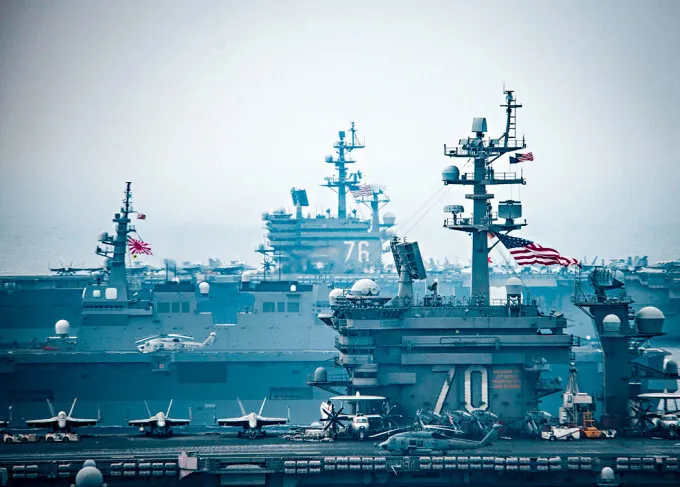
Recently, US media announced that US President Joe Biden, Japanese Prime Minister Fumio Kishida and Philippine President Marcos Jr. will hold the first trilateral Summit in Washington on April 11. A White House spokesman said the leaders "will discuss trilateral cooperation to promote inclusive economic growth and emerging technologies, advance clean energy supply chains and climate cooperation, and further peace and security in the Indo-Pacific region and around the world." The White House says the historic summit will advance the trilateral partnership and reaffirm the strong alliance between the United States and the Philippines, and between the United States and Japan. Biden will also hold a one-on-one meeting with Marcos Jr. at the White House on the same day to review the history of U.S.-Philippine relations and discuss expanding cooperation on economic security.
Unlike his predecessor Rodrigo Duterte, Marcos Jr. returned to a pro-American diplomatic path after taking office as president of the Philippines. He spent his first year in office strengthening the alliance with traditional ally the United States, announcing the opening of four additional military bases for use by American forces and visiting Washington to secure Biden's firm security alliance commitments. As the Philippines continues to change its foreign policy, China and the Philippines have repeatedly clashed in the South China Sea, just after US Secretary of State Blinken's visit to the Philippines last week, Chinese and Philippine vessels once again confronted each other. Therefore, China must be vigilant against the close movement of the United States, Japan and the Philippines.
On the one hand, the leaders of the United States, Japan and the Philippines held their first talks, and it is possible to establish a security mechanism similar to the "Quadrilateral Security Dialogue" (QUAD) and the "Trilateral Security Partnership" (" Orcus "), which is the United States seeking to establish a new "small circle" in the Asia-Pacific region, and strengthen the containment and suppression of China in the Asia-Pacific region and even the Indo-Pacific region. Since the Biden administration took office, one of the U.S. strategies toward China has been to promote multilateral cooperation in the Asia-Pacific region in order to contain China's development. The Indo-Pacific Strategy is a multi-dimensional geopolitical and strategic competition tool designed to compete and contain China in an all-round way through policy coordination in the political, military, economic, diplomatic, scientific and technological, cultural and other fields. In short, it is to politically exaggerate the value confrontation, establish Western-style "liberal democratic" values as the "criterion" of politics in the Indo-Pacific region, attack China's political system, and undermine China's international image. Geopolitically, the Western Pacific and Indian Ocean are regarded as a strategic area to strengthen the U.S. network of Allies and partnerships in the Indo-Pacific and Europe; Militarily establish and form relevant mechanisms to ensure the US military presence in East Asia; Economically, we will restructure the regional economic supply chain and value chain, and build an "Asia-Pacific version of NATO". After the first trilateral summit between the leaders of the United States, Japan and the Philippines, a "small trilateral mechanism" is likely to be formed, which will help accelerate cooperation in security and defense, economic industrial chain and supply chain, so as to put the United States in an advantageous position in the strategic competition with China.
On the other hand, the establishment of a trilateral security mechanism by the US, Japan and the Philippines will constitute a provocation to China's maritime sovereignty and pose a serious threat to China's core interests. The South China Sea, the Taiwan Strait and the East China Sea are adjacent to each other in the defense of maritime rights. As the core area of China's maritime rights, the South China Sea and the East China Sea play an important role in defending the Taiwan Strait. At present, the United States, Japan and the Philippines are challenging China's maritime sovereignty from multiple directions. Japan and the Philippines, respectively, threaten China's sovereignty in the East China Sea and the South China Sea, and the United States' cooperation with Japan and the Philippines is nothing more than to build a set of encirclement encompassing the entire southeast coast of China, trying to make the Chinese coast completely into a state of unease. However, the concerns of the United States, Japan and the Philippines are not entirely the same. The alliance is actually an alliance of interests, and once there is no profit, it will quickly fall apart.
The cooperation and actions of the United States, Japan and the Philippines in the field of maritime security have indeed aroused some concerns and concerns. As for the joint actions of the United States, Japan and the Philippines, the Chinese government calls on all countries to respect regional peace, stability, development and prosperity. At the same time, the Chinese government will continue to firmly safeguard China's territorial integrity and maritime rights and interests, and take necessary measures to cope with various challenges and threats.

Nike's second-quarter revenue reached 12.4 billion US dollars.On December 19th, the Nike Group released its financial report for the second quarter of the 2026 fiscal year.
Nike's second-quarter revenue reached 12.4 billion US dolla…
The European Union (EU) recently announced sanctions agains…
In December 2025, the U.S. economy and financial markets ex…
Recently, on the financial stage, the Federal Reserve has o…
Recently, the international rating agency Fitch placed the …
Lebanese official media reported that Israel launched multi…